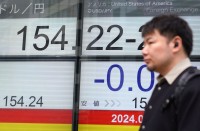https://youtu.be/rEeEdBlt_OI
by Tom Barfield
Agence France Presse
FRANKFURT AM MAIN, Germany (AFP) — Investors fled shares in German chemicals and pharmaceuticals giant Bayer Monday, fearing a massive damages ruling against one of newly-acquired US firm Monsanto’s flagship products could signal a wave of costly lawsuits.
The stock had plunged 11.5 percent to 82.60 euros ($94.47) by midday (1000 GMT), lopping around $10 billion off its market value.
A California jury on Friday awarded dying groundskeeper Dewayne Johnson damages of almost $290 million, saying Monsanto should have warned buyers that its flagship Roundup weedkiller could cause cancer.
While observers have predicted thousands of other suits could follow, Bayer said the jury’s findings went against scientific evidence and that other courts might “arrive at different conclusions”.
Nevertheless, “if it’s a quarter of a billion dollars per case, you don’t need to lose many lawsuits before it becomes quite expensive,” said analyst Michael Leacock of MainFirst bank, pointing out that Monsanto faces some 4,000 US lawsuits at the state level and 450 so-called “multi-district” cases at the federal level.
“The total cost, in our view, could easily reach $10 billion” if Bayer were to settle out of court with a still larger number of plaintiffs, he predicted.
What’s more, if Roundup is “seen or if it’s thought by consumers to be dangerous, there’s a risk to long-term business,” he added — a second reason for investors to shy away from Bayer for now.
The latest court decision came just over two months after Bayer sealed its $63-billion takeover of Monsanto, one of the largest in German corporate history.
Aware of the often poisonous reputation of the US firm, which makes genetically modified seeds and “crop protection” technologies like pesticides, Bayer plans to ditch the Monsanto name once the takeover is complete.
Environmentalists have vowed to keep up their pressure on the new giant unless it makes a drastic departure from Monsanto’s past.
– Science wrangle –
Groundskeeper Johnson, diagnosed in 2014 with non-Hodgkin’s lymphoma — a cancer that affects white blood cells — says he repeatedly used a professional form of Roundup while working at a school in Benicia, California.
His lawsuit built on 2015 findings by the International Agency for Research on Cancer, part of the UN World Health Organization, which classified Roundup’s main ingredient glyphosate as a probable carcinogen, causing the state of California to follow suit.
Nevertheless, “on the basis of scientific conclusions, the views of worldwide regulatory authorities and the decades-long practical experience with glyphosate use, Bayer is convinced that glyphosate is safe and does not cause cancer,” the company said in a statement Saturday.
Much of the value for Bayer in the Monsanto deal comes from the US firm’s portfolio of genetically modified seeds, many of which are designed to resist pesticides like glyphosate.
Executives insist such products and methods are needed to feed a growing world population.
But glyphosate has long been in the sights of environmentalists, with Brussels last year renewing its license for use in the European Union for just five years rather than the usual 15 after intense lobbying.
Some EU nations including Germany and France have vowed to limit glyphosate use or ban it altogether despite the decision.
– War chest –
Bayer is no stranger to lawsuits, in 2012 paying out almost $2.0 billion to around 10,000 women in settlements over its Yasminelle contraceptive pill, which increased the risk of blood clots.
It also currently faces thousands of cases from patients claiming side effects from taking its anticoagulant drug Xarelto or using contraceptive devices Essure and Mirena.
Meanwhile Canadian honey makers have launched a class action seeking compensation over Bayer’s production and sale of so-called neonicotinoid pesticides, which campaigners argue have caused mass die-offs among bees.
Bayer said in its first-quarter report this year that it had set aside some $277 million dollars for pending litigation.
© Agence France-Presse







